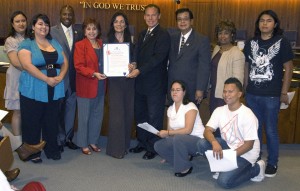In 1970, an interdisciplinary program called Mexican American studies was offered at California State University, Dominguez Hills. In 1994, it was designated as a stand-alone program and the Chicana/Chicano studies department was established. On Sept. 1, Irene Vasquez, chair and professor of Chicana/Chicano studies was recognized with her students at a meeting of the Carson City Council in celebration of the 40th anniversary of the discipline at CSU Dominguez Hills and in conjunction with Hispanic Heritage Month.

Vasquez, who arrived at the university in 2005, said that she was attracted to teaching Chicana/Chicano studies at CSU Dominguez Hills because of the student demographics and its connection to her research in the foundational influences that indigenous, African, and mixed-descent populations had on the development of Latino societies and cultures. She says that learning about these histories is important for all students, particularly in the Los Angeles area and the Southwest in the face of new immigration laws.
“The history of Native American, African and mixed-descent peoples is as basic to U.S. history as that of Europeans,” she said. “Peoples from what is [now] Mexico settled major areas of the U.S. In California, people of Mexican descent helped shape the state governmental framework. [They] donated the land on which California state colleges and universities, including CSU Dominguez Hills, stand. Now more than ever, especially with what is going on in Arizona, we need to support a balanced and accurate telling of the past and the present, so that we don’t purposely or inadvertently promote ignorance and misrepresentation.”
Senior Lauren Romero was happy that the city of Carson, which was founded on part of lands once owned by Manuel Dominguez, a Californio statesman and cattle rancher, recognized the Chicana/Chicano studies department at CSU Dominguez Hills on its 40th anniversary, which coincides with 40th anniversaries of Chicano studies at a number of institutions nationwide.
“Every city should do it,” she said.
Romero said that when she entered CSU Dominguez Hills as a freshman, she did not know what major to choose but “saw Chicano studies as an open window to do anything.” She is now choosing between entering either the teaching credential program or master’s of social work program at the university when she graduates next spring.
“I am so proud to have had opportunities to work with diverse student scholars who have completed or are enrolled in master’s and doctorate programs in various disciplines,” said Vasquez. “They are in law degree programs, in social work, and teaching programs. A good majority of our students want to become professors, teachers, principles, lawyers, social workers, probation officers, program managers, case workers and counselors.”
Studying a field with such deep connections to social justice has affected the career choices of many Chicana/Chicano studies majors. Freshman Daniel Coronado looks forward to a career in law enforcement. He hopes to use his knowledge of a largely untold history to help incarcerated youth in the way it has helped him.
“I wanted to learn more about my history, a history I never learned before,” he said. “It got me more in touch with myself.”
Alumna Alejandra Hernandez (Class of ’09, B.A., Chicana/Chicano studies) is in the process of entering a master’s program at the University of Southern California for a credential to teach social science.
“Chicano history is so deeply rooted in Los Angeles and all the areas of the Southwest,” said Hernandez, a Los Angeles native. “It is [unfathomable] for one to live here and not know about the people and their accomplishments.”
Senior Richard Gutierrez said that the discipline of Chicano studies informs students of Mexican, Latino, and mixed-descent populations with “information that would usually be lost to us.”
“Typically throughout K-12, we are so focused on Anglo contributions to the world that we are left to wonder what Latinos have brought to the world,” said Gutierrez. “Chicano studies brings pride to [those of] Hispanic heritage that would go unheard of if not for Chicano studies.”
A presentation and discussion by two founders of the Chicano studies discipline will take place on Oct. 7, sponsored by Chicana/Chicano studies at CSU Dominguez Hills. Juan Gomez-Quinones, professor of history at UCLA and Gracia Molina de Pick, professor of Chicano studies at Mesa College will speak at the Loker Student Union. For more information, contact Dr. Vasquez at (310) 243-3070.
For more information on Chicana/Chicano studies at CSU Dominguez Hills, click here.